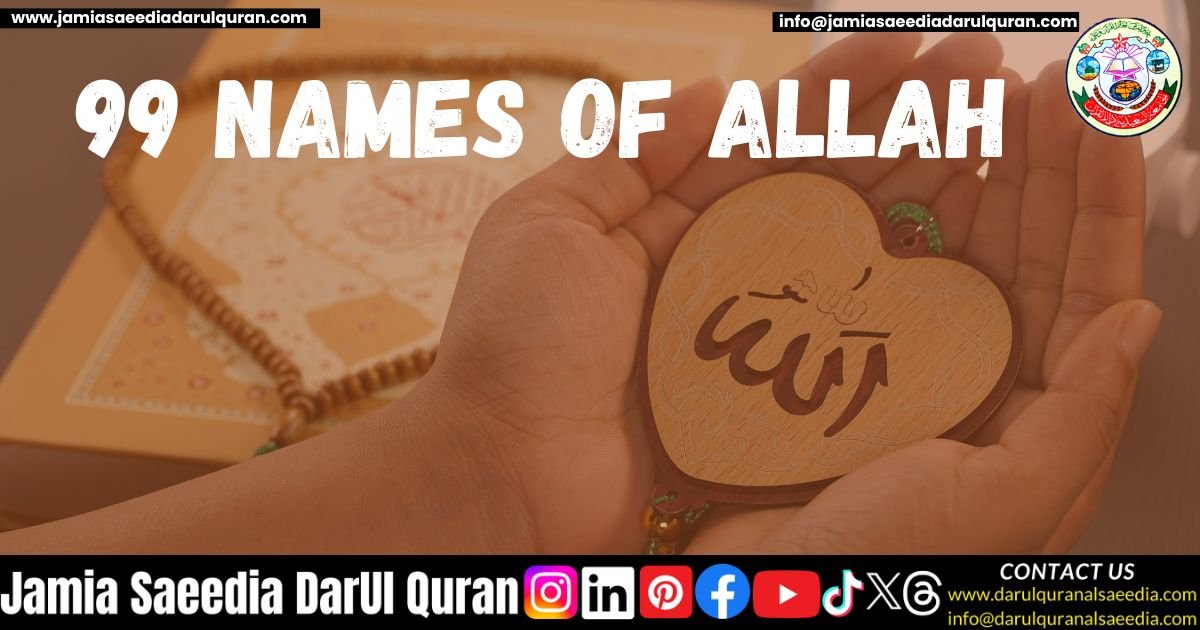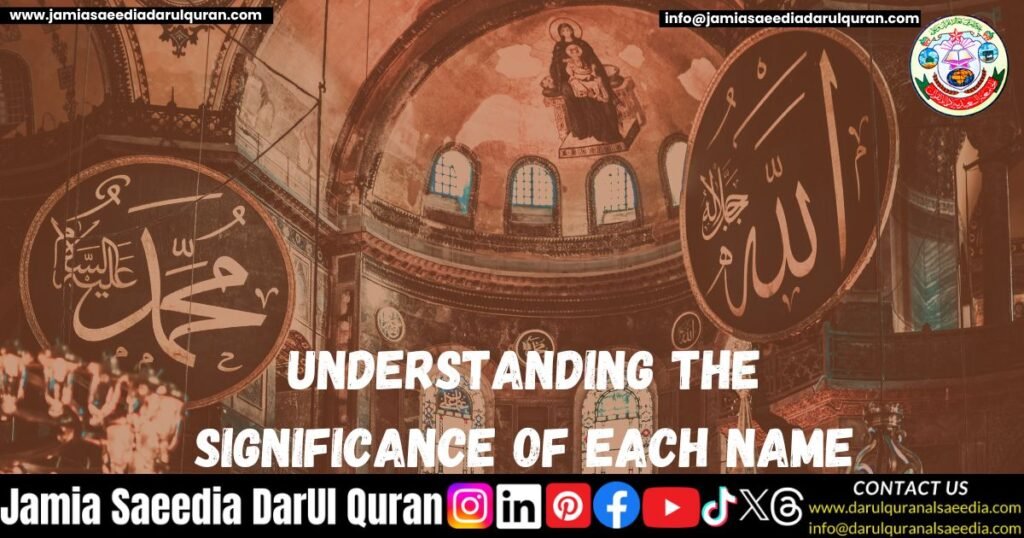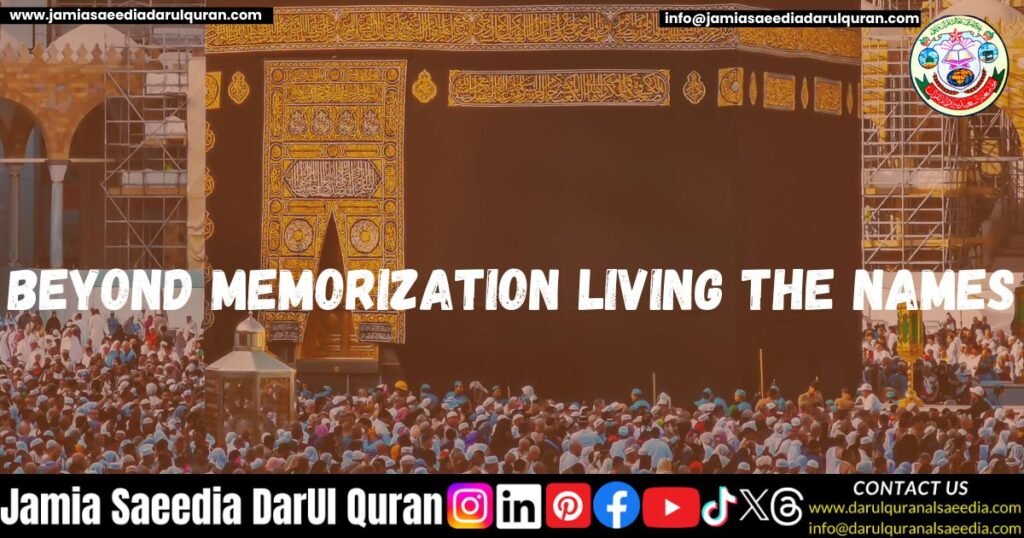
Unlock a deeper understanding of Allah through His “99 Names of Allah” (Asma ul Husna). This article explores the significance of learning these names, offering practical ways to integrate them into your daily life, and revealing how this journey strengthens your faith and connection with the Divine. Discover how to embody these attributes for personal growth and utilize modern tools like AI-powered platforms for Quran memorization to enhance your spiritual journey.
Read More: Ibadat for Shab-e-Barat 2025
The 99 Names of Allah: A Journey to Knowing and Loving the Divine
Islam’s foundation rests upon the concept of Tawhid, the absolute oneness of Allah. But how can we, as humans with finite understanding, truly grasp the infinite nature of the Divine? The answer, in part, lies in the Asma ul Husna – the 99 Names of Allah. These are not mere labels but rather luminous windows into the attributes, actions, and essence of the Almighty. They offer a path towards a deeper, more loving, and more conscious relationship with our Creator.
The 99 Names of Allah (SWT) with meaning
| # | Name | Transliteration | Meaning |
|---|---|---|---|
| 1 | الرَّحْمَنُ | AR-RAHMAAN | The Beneficent |
| 2 | الرَّحِيمُ | AR-RAHEEM | The Merciful |
| 3 | الْمَلِكُ | AL-MALIK | The King |
| 4 | الْقُدُّوسُ | AL-QUDDUS | The Most Sacred |
| 5 | السَّلاَمُ | AS-SALAM | The Source of Peace, The Flawless |
| 6 | الْمُؤْمِنُ | AL-MU’MIN | The Infuser of Faith |
| 7 | الْمُهَيْمِنُ | AL-MUHAYMIN | The Preserver of Safety |
| 8 | الْعَزِيزُ | AL-AZIZ | All Mighty |
| 9 | الْجَبَّارُ | AL-JABBAR | The Compeller, The Restorer |
| 10 | ُالْمُتَكَبِّر | AL-MUTAKABBIR | The Supreme, The Majestic |
| 11 | الْخَالِقُ | AL-KHAALIQ | The Creator, The Maker |
| 12 | الْبَارِئُ | AL-BAARI | The Evolver |
| 13 | الْمُصَوِّرُ | AL-MUSAWWIR | The Fashioner |
| 14 | الْغَفَّارُ | AL-GHAFFAR | The Constant Forgiver |
| 15 | الْقَهَّارُ | AL-QAHHAR | The All-Prevailing One |
| 16 | الْوَهَّابُ | AL-WAHHAAB | The Supreme Bestower |
| 17 | الرَّزَّاقُ | AR-RAZZAAQ | The Provider |
| 18 | الْفَتَّاحُ | AL-FATTAAH | The Supreme Solver |
| 19 | اَلْعَلِيْمُ | AL-‘ALEEM | The All-Knowing |
| 20 | الْقَابِضُ | AL-QAABID | The Withholder |
| 21 | الْبَاسِطُ | AL-BAASIT | The Extender |
| 22 | الْخَافِضُ | AL-KHAAFIDH | The Reducer |
| 23 | الرَّافِعُ | AR-RAAFI’ | The Exalter, The Elevator |
| 24 | الْمُعِزُّ | AL-MU’IZZ | The Honourer, The Bestower |
| 25 | ٱلْمُذِلُّ | AL-MUZIL | The Dishonourer |
| 26 | السَّمِيعُ | AS-SAMEE’ | The All-Hearing |
| 27 | الْبَصِيرُ | AL-BASEER | The All-Seeing |
| 28 | الْحَكَمُ | AL-HAKAM | The Impartial Judge |
| 29 | الْعَدْلُ | AL-‘ADL | The Utterly Just |
| 30 | اللَّطِيفُ | AL-LATEEF | The Subtle One, The Most Gentle |
| 31 | الْخَبِيرُ | AL-KHABEER | The All-Aware |
| 32 | الْحَلِيمُ | AL-HALEEM | The Most Forbearing |
| 33 | الْعَظِيمُ | AL-‘AZEEM | The Magnificent, The Supreme |
| 34 | الْغَفُور | AL-GHAFOOR | The Great Forgiver |
| 35 | الشَّكُورُ | ASH-SHAKOOR | The Most Appreciative |
| 36 | الْعَلِيُّ | AL-‘ALEE | The Most High, The Exalted |
| 37 | الْكَبِيرُ | AL-KABEER | The Most Great |
| 38 | الْحَفِيظُ | AL-HAFEEDH | The Preserver |
| 39 | المُقيِت | AL-MUQEET | The Sustainer |
| 40 | اﻟْﺣَسِيبُ | AL-HASEEB | The Reckoner |
| 41 | الْجَلِيلُ | AL-JALEEL | The Majestic |
| 42 | الْكَرِيمُ | AL-KAREEM | The Most Generous, The Most Esteemed |
| 43 | الرَّقِيبُ | AR-RAQEEB | The Watchful |
| 44 | ٱلْمُجِيبُ | AL-MUJEEB | The Responsive One |
| 45 | الْوَاسِعُ | AL-WAASI’ | The All-Encompassing, the Boundless |
| 46 | الْحَكِيمُ | AL-HAKEEM | The All-Wise |
| 47 | الْوَدُودُ | AL-WADUD | The Most Loving |
| 48 | الْمَجِيدُ | AL-MAJEED | The Glorious, The Most Honorable |
| 49 | الْبَاعِثُ | AL-BA’ITH | The Infuser of New Life |
| 50 | الشَّهِيدُ | ASH-SHAHEED | The All Observing Witnessing |
| 51 | الْحَقُ | AL-HAQQ | The Absolute Truth |
| 52 | الْوَكِيلُ | AL-WAKEEL | The Trustee, The Disposer of Affairs |
| 53 | الْقَوِيُ | AL-QAWIYY | The All-Strong |
| 54 | الْمَتِينُ | AL-MATEEN | The Firm, The Steadfast |
| 55 | الْوَلِيُّ | AL-WALIYY | The Protecting Associate |
| 56 | الْحَمِيدُ | AL-HAMEED | The Praiseworthy |
| 57 | الْمُحْصِي | AL-MUHSEE | The All-Enumerating, The Counter |
| 58 | الْمُبْدِئُ | AL-MUBDI | The Originator, The Initiator |
| 59 | ٱلْمُعِيدُ | AL-MUEED | The Restorer, The Reinstater |
| 60 | الْمُحْيِي | AL-MUHYI | The Giver of Life |
| 61 | اَلْمُمِيتُ | AL-MUMEET | The Creator of Death |
| 62 | الْحَيُّ | AL-HAYY | The Ever-Living |
| 63 | الْقَيُّومُ | AL-QAYYOOM | The Sustainer, The Self-Subsisting |
| 64 | الْوَاجِدُ | AL-WAAJID | The Perceiver |
| 65 | الْمَاجِدُ | AL-MAAJID | The Illustrious, the Magnificent |
| 66 | الْواحِدُ | AL-WAAHID | The One |
| 67 | اَلاَحَدُ | AL-AHAD | The Unique, The Only One |
| 68 | الصَّمَدُ | AS-SAMAD | The Eternal, Satisfier of Needs |
| 69 | الْقَادِرُ | AL-QADEER | The Omnipotent One |
| 70 | الْمُقْتَدِرُ | AL-MUQTADIR | The Powerful |
| 71 | الْمُقَدِّمُ | AL-MUQADDIM | The Expediter, The Promoter |
| 72 | الْمُؤَخِّرُ | AL-MU’AKHKHIR | The Delayer |
| 73 | الأوَّلُ | AL-AWWAL | The First |
| 74 | الآخِرُ | AL-AAKHIR | The Last |
| 75 | الظَّاهِرُ | AZ-ZAAHIR | The Manifest |
| 76 | الْبَاطِنُ | AL-BAATIN | The Hidden One, Knower of the Hidden |
| 77 | الْوَالِي | AL-WAALI | The Sole Governor |
| 78 | الْمُتَعَالِي | AL-MUTA’ALI | The Self Exalted |
| 79 | الْبَرُّ | AL-BARR | The Source of All Goodness |
| 80 | التَّوَابُ | AT-TAWWAB | The Ever-Pardoning |
| 81 | الْمُنْتَقِمُ | AL-MUNTAQIM | The Avenger |
| 82 | العَفُوُ | AL-‘AFUWW | The Pardoner |
| 83 | الرَّؤُوفُ | AR-RA’OOF | The Most Kind |
| 84 | َمَالِكُ ٱلْمُلْكُ | MAALIK-UL-MULK | Master of the Kingdom, Owner of the Dominion |
| 85 | ذُوالْجَلاَلِ وَالإكْرَامِ | DHUL-JALAALI WAL-IKRAAM | Lord of Glory and Honour, Lord of Majesty and Generosity |
| 86 | الْمُقْسِطُ | AL-MUQSIT | The Just One |
| 87 | الْجَامِعُ | AL-JAAMI’ | The Gatherer, the Uniter |
| 88 | ٱلْغَنيُّ | AL-GHANIYY | The Self-Sufficient, The Wealthy |
| 89 | ٱلْمُغْنِيُّ | AL-MUGHNI | The Enricher |
| 90 | اَلْمَانِعُ | AL-MANI’ | The Withholder |
| 91 | الضَّارَ | AD-DHARR | The Distresser |
| 92 | النَّافِعُ | AN-NAFI’ | The Propitious, the Benefactor |
| 93 | النُّورُ | AN-NUR | The Light, The Illuminator |
| 94 | الْهَادِي | AL-HAADI | The Guide |
| 95 | الْبَدِيعُ | AL-BADEE’ | The Incomparable Originator |
| 96 | اَلْبَاقِي | AL-BAAQI | The Everlasting |
| 97 | الْوَارِثُ | AL-WAARITH | The Inheritor, The Heir |
| 98 | الرَّشِيدُ | AR-RASHEED | The Guide, Infallible Teacher |
| 99 | الصَّبُورُ | AS-SABOOR | The Forbearing, The Patient |
Why Learn the Names of Allah?
Imagine trying to love someone you don’t know. It’s a challenge, isn’t it? Similarly, our love for Allah flourishes when we begin to understand Him, not just as an abstract concept, but through His beautiful names. The Quran emphasizes the importance of knowing these names:
“And to Allah belong the best names, so invoke Him by them.” (Quran 7:180)
These names are repeated throughout the Quran, serving as constant reminders and invitations to contemplate Allah’s qualities. To truly believe in Allah is to understand Him through His names and attributes. Learning and memorizing them is a sacred journey that leads to a profound understanding of the Divine.
The Promise of Paradise
The Prophet Muhammad (peace be upon him) emphasized the significance of learning the Asma ul Husna, stating:
“Allah has ninety-nine names, i.e. one-hundred minus one, and whoever knows them will go to Paradise.” (Bukhari)
This hadith signifies that knowing the names of Allah is not just about memorization; it’s about understanding their meanings, reflecting on their implications, and embodying them in our lives. It’s about allowing these divine attributes to shape our character and actions.
Benefits Beyond Reward
The benefits extend far beyond the promise of Paradise. Learning the names of Allah brings:
- Increased Love and Connection: Each name reveals a facet of Allah’s love, mercy, power, wisdom, and justice. Contemplating these attributes deepens our love for Him.
- Enhanced Understanding of the Quran: Many verses in the Quran directly relate to specific names of Allah. Understanding these names unlocks deeper layers of meaning in the sacred text.
- Inner Peace and Tranquility: Reflecting on names like Al-Salam (The Source of Peace) or Al-Mu’min (The Guardian of Faith) can bring solace and comfort during times of hardship.
- Improved Dua (Supplication): When we call upon Allah using His names, we acknowledge His attributes and tailor our prayers to specific needs and circumstances.
- Personal Growth: Emulating Allah’s attributes, to the best of our human ability, leads to personal and spiritual growth. For example, striving to be just like Al-‘Adl (The Just) or compassionate like Ar-Rahim (The Most Merciful).

Understanding the Significance of Each Name
The 99 Names of Allah are not simply a list; they are a tapestry woven with profound meanings and interconnected relationships. Each name offers a unique perspective on the Divine. Here are a few examples:
- Ar-Rahman (The Most Compassionate) & Ar-Rahim (The Most Merciful): These two names, often paired together, emphasize Allah’s boundless compassion and mercy. Ar-Rahman signifies a general compassion that encompasses all of creation, while Ar-Rahim denotes a specific mercy for believers.
- Al-Malik (The Sovereign Lord): This name reminds us that Allah is the ultimate ruler and owner of everything in existence. It instills humility and reminds us to submit to His will.
- Al-Quddus (The Most Holy): This name signifies Allah’s perfection and purity, free from any imperfection or deficiency. It inspires us to purify ourselves, both inwardly and outwardly.
- Al-Khaliq (The Creator), Al-Bari’ (The Maker), & Al-Musawwir (The Fashioner): These three names highlight Allah’s creative power and artistry. They encourage us to appreciate the beauty and complexity of creation.
- Al-Ghaffar (The All-Forgiving): This name offers immense hope and reassurance to those who have sinned. It reminds us that Allah’s forgiveness is always available to those who sincerely repent.
- Ar-Razzaq (The Provider): This name assures us that Allah provides for all His creation. It encourages us to trust in Him and seek sustenance through lawful means.
- Al-‘Alim (The All-Knowing) & Al-Hakim (The All-Wise): These names emphasize Allah’s infinite knowledge and wisdom. They remind us to seek knowledge and make wise decisions.
- Al-‘Adl (The Just): This name highlights Allah’s perfect justice, ensuring that everyone will receive what they deserve. It inspires us to be just in our dealings with others.
- Al-Wadud (The Loving): This name reveals Allah’s immense love for His creation, especially for those who believe in Him. It encourages us to cultivate love for Allah and for others.
- As-Sabur (The Patient): This name reflects Allah’s ability to remain patient with His creation, even when they disobey Him. It encourages us to be patient in times of difficulty.
These are just a few examples. Each of the 99 names offers a wealth of wisdom and insight into the nature of Allah.
How to Embark on This Journey
Learning the 99 Names of Allah is a lifelong journey, not a destination. Here’s a practical guide to help you get started:
- Start with Understanding: Don’t just memorize the names; understand their meanings. Read explanations of each name and reflect on its implications.
- Incorporate into Daily Life: Call upon Allah using His names in your daily prayers and supplications. For example, when seeking forgiveness, invoke Al-Ghaffar (The All-Forgiving).
- Reflect on the Quran: Pay attention to the names of Allah mentioned in the Quran and try to understand their context.
- Read the Seerah of the Prophet (PBUH): The Prophet Muhammad (peace be upon him) embodied the attributes of Allah in his character and actions. Studying his life provides practical examples of how to live by these names.
- Make it a Habit: Dedicate a few minutes each day to learning and reflecting on the names of Allah. Consistency is key.
- Use Resources: Utilize books, websites, and apps that provide explanations and audio recitations of the Asma ul Husna.
- Teach Others: Sharing your knowledge with others is a great way to reinforce your own understanding.
- Connect with the Names Emotionally: Let the meanings of the names sink into your heart. Feel the love, the awe, the hope, and the peace that they inspire.
- Strive to Emulate the Attributes: While we can never perfectly embody Allah’s attributes, we can strive to reflect them in our own lives. Be compassionate, just, wise, and forgiving.
- Use Digital Tools: Consider using apps like Tarteel to help with memorization and understanding of the Quran, which will inherently deepen your connection with the names of Allah.
Integrating the Asma ul Husna into Daily Life
The true power of learning the Asma ul Husna lies in integrating them into our daily lives. Here are some practical ways to do that:
- In Times of Difficulty: When faced with hardship, remember Ar-Rahman (The Most Compassionate) and Ar-Rahim (The Most Merciful). Trust that Allah’s mercy will prevail.
- When Making Decisions: Seek guidance from Al-Hakim (The All-Wise) and ask for wisdom in your choices.
- When Feeling Anxious: Remember Al-Mu’min (The Guardian of Faith) and trust in Allah’s protection.
- When Seeking Forgiveness: Turn to Al-Ghaffar (The All-Forgiving) and sincerely repent for your sins.
- When Giving Thanks: Acknowledge Al-Mun’im (The Benefactor) and express gratitude for all of Allah’s blessings.
- When Interacting with Others: Treat everyone with kindness and justice, reflecting the attributes of Ar-Rahim (The Most Merciful) and Al-‘Adl (The Just).
- When Observing Nature: Appreciate the beauty and complexity of creation, recognizing the artistry of Al-Khaliq (The Creator), Al-Bari’ (The Maker), and Al-Musawwir (The Fashioner).
- When Feeling Weak: Remember Al-Qawi (The All-Strong) and Al-‘Aziz (The Almighty) and seek strength from Allah.
- When Feeling Lost: Turn to Al-Hadi (The Guide) and ask for guidance on the right path.
- Before Sleeping: Reflect on Al-Muhaymin (The Protector) and trust in Allah’s care throughout the night.
By consciously integrating the Asma ul Husna into our daily lives, we can transform our understanding of Allah from an abstract concept into a living, breathing reality.
Beyond Memorization: Living the Names
Memorizing the 99 Names of Allah is a commendable first step, but the true essence lies in living those names. It’s about embodying the qualities they represent in our actions, thoughts, and interactions.
Imagine someone who knows Al-‘Adl (The Just) but acts unfairly in their dealings. Their knowledge remains superficial. True understanding manifests in just and equitable behavior.

Similarly, knowing Ar-Rahim (The Most Merciful) should inspire us to be merciful and compassionate towards others, especially those in need. Knowing Al-Ghaffar (The All-Forgiving) should encourage us to forgive those who wrong us and to seek forgiveness for our own mistakes.
This active engagement with the names of Allah transforms them from mere words into guiding principles, shaping our character and bringing us closer to the Divine.
The Role of AI in Learning and Connecting with the Quran
In today’s digital age, technology can be a powerful tool for learning and connecting with the Quran. Platforms like Tarteel utilize AI to enhance the memorization process, offering personalized learning plans, mistake detection, and reflective engagement with verses.
While technology can be a valuable aid, it’s important to remember that it’s just a tool. The true connection with Allah comes from the heart, through sincere reflection, prayer, and action. AI can facilitate the learning process, but it cannot replace the human element of faith.
A Lifelong Journey
Learning the 99 Names of Allah is not a task to be completed, but a journey to be embraced. It’s a lifelong exploration of the Divine, a continuous process of learning, reflecting, and growing closer to Allah. As we delve deeper into the meanings of these beautiful names, we unlock a profound understanding of ourselves, our purpose, and our relationship with the Creator. This journey will fill our lives with love, peace, wisdom, and a deep sense of connection to the Divine.
Frequently Asked Questions (FAQs)
Q: What are the 99 Names of Allah also known as?
A: The 99 Names of Allah are also known as Asma ul Husna, which translates to “The Most Beautiful Names.”
Q: Is it obligatory to memorize all 99 Names of Allah?
A: While not obligatory, learning and understanding the 99 Names of Allah is highly encouraged and considered a virtuous act in Islam, with immense spiritual benefits.
Q: What is the significance of learning the 99 Names of Allah?
A: Learning the 99 Names helps in understanding Allah’s attributes, strengthening faith, and drawing closer to Him, leading to increased love, reverence, and inner peace.
Q: How can learning the 99 Names of Allah improve my understanding of the Quran?
A: Many verses in the Quran refer to specific names of Allah. Understanding these names provides deeper context and meaning to those verses.
Q: What is the best way to memorize the 99 Names of Allah?
A: Start by understanding the meaning of each name, then memorize them gradually, using flashcards, audio recitations, and incorporating them into daily prayers.
Q: What is the meaning of “Ar-Rahman” and “Ar-Rahim”?
A: Ar-Rahman means “The Most Compassionate,” signifying Allah’s general compassion for all creation, while Ar-Rahim means “The Most Merciful,” denoting specific mercy for believers.
Q: How can I incorporate the 99 Names of Allah into my daily life?
A: Use the names in your prayers, reflect on their meanings during daily activities, and strive to embody the attributes they represent in your actions and interactions.
Q: What does the name “Al-Malik” signify?
A: Al-Malik means “The Sovereign Lord,” reminding us that Allah is the ultimate ruler and owner of everything in existence, instilling humility and submission to His will.
Q: What does the name “Al-Quddus” mean?
A: Al-Quddus means “The Most Holy,” signifying Allah’s perfection and purity, free from any imperfection, inspiring us to purify ourselves inwardly and outwardly.
Q: How can the name “Al-Ghaffar” provide comfort in times of difficulty?
A: Al-Ghaffar means “The All-Forgiving,” offering hope and reassurance that Allah’s forgiveness is always available to those who sincerely repent.
Q: What is the meaning of “Ar-Razzaq”?
A: Ar-Razzaq means “The Provider,” assuring us that Allah provides for all His creation, encouraging us to trust in Him and seek sustenance through lawful means.
Q: How does knowing “Al-‘Alim” and “Al-Hakim” influence our actions?
A: Al-‘Alim (The All-Knowing) and Al-Hakim (The All-Wise) remind us to seek knowledge and make wise decisions, guided by Allah’s infinite wisdom.
Q: What does it mean to emulate the attribute of “Al-‘Adl”?
A: Emulating “Al-‘Adl” (The Just) means striving to be just and equitable in all our dealings with others, reflecting Allah’s perfect justice.
Q: Why is “Al-Wadud” a significant name to reflect on?
A: “Al-Wadud” (The Loving) reveals Allah’s immense love for His creation, encouraging us to cultivate love for Allah and for others, fostering deeper connection.
Q: How can reflecting on “As-Sabur” help in difficult times?
“As-Sabur” (The Patient) reflects Allah’s patience, encouraging us to be patient in times of difficulty, trusting in His wisdom and timing.
Q: What role does technology play in learning the 99 Names of Allah?
A: Technology, like AI-powered apps, can assist in memorization, provide explanations, and offer personalized learning experiences, enhancing the learning process.
Q: How can I make the learning of 99 Names a continuous process?
A: Dedicate time daily, reflect on the names, incorporate them into prayers, read the Quran, and share knowledge with others to make learning continuous.
Q: What is the key to truly connecting with the 99 Names of Allah?
A: The key is to move beyond mere memorization to understanding, reflecting, and embodying the attributes in daily life, fostering a living connection with the Divine.
Q: How does understanding Allah’s names strengthen our faith?
A: Understanding these names allows us to grasp Allah’s attributes, which strengthens our faith by making Allah more relatable and understandable.
Q: Can non-Arabic speakers effectively learn and understand the 99 Names of Allah?
A: Yes, resources such as translations, explanations, and audio recitations are available in various languages, making it accessible for non-Arabic speakers to learn and connect with the 99 Names of Allah.









